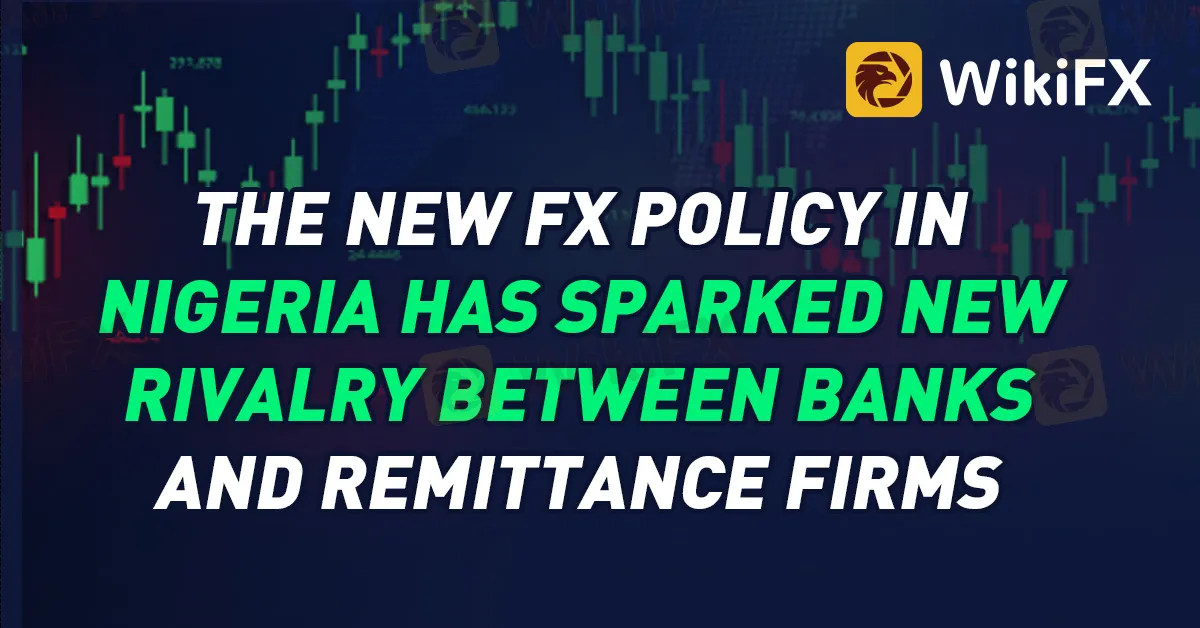简体中文
繁體中文
English
Pусский
日本語
ภาษาไทย
Tiếng Việt
Bahasa Indonesia
Español
हिन्दी
Filippiiniläinen
Français
Deutsch
Português
Türkçe
한국어
العربية
THE NEW FX POLICY IN NIGERIA HAS SPARKED NEW RIVALRY BETWEEN BANKS AND REMITTANCE FIRMS
Abstract:Digital remittance firms' business operations and potentially even their strategies would be impacted by Nigeria's unified FX rate. What will Nigerian fintechs' path to success in cross-border payments look like with traditional banks making a comeback?

Digital remittance firms' business operations and potentially even their strategies would be impacted by Nigeria's unified FX rate. What will Nigerian fintechs' path to success in cross-border payments look like with traditional banks making a comeback?
Any Nigerian would tell you that it is difficult to send and receive money from abroad because of the country's stringent rules governing international transactions and complex foreign exchange (FX) system. Digital remittance firms that provide immediate and fee-free cross-border transfers have gained access to the market thanks to these tight restrictions and the inefficiency of traditional competitors. However, the introduction of a single FX rate in Nigeria may increase competition for these remittance startups.
According to Adedeji Olowe, the founder of Lendsqr, a lending SaaS fintech, banks and startups that handle digital remittances will compete as a result of the currency rate's unification. “Banks with overseas branches can begin focusing on Nigerians and promising them to help them send money directly to a naira bank account at a specific rate,” he said. According to estimates in the local media, during the last eight years, Nigerians in the Diaspora have sent $168.33 billion home. It is expected that banks will seek a larger share of the market. For instance, the American internet remittance firm Remitly and Access Bank have cooperated. Wema Bank, the first bank to do so, raised the dollar cap for all holders of its ALAT card—a naira debit card—from $20 to $500 last week.
Despite these new product developments from banks that demonstrate their ability to compete with startups, many industry analysts think that startups are more likely to succeed. Startups that specialize in digital remittances are more user-friendly and provide better customer service than many banks currently can. Additionally, because these companies frequently don't offer a wide range of goods or services, they can benefit from their laser-like focus to advance their offers faster than the banks.
Digital remittance startups can explore creative ways to improve user experience, lower transaction costs, reach underserved markets, and utilize cutting-edge technologies like blockchain for quicker and more secure transfers, according to Charles Odogwu, a digital payments expert with experience in Nigeria's banking sector. Odogwu continued, “They can provide additional financial services like savings, investment choices, or digital wallets.”
Already, several fintechs are operating swiftly. Nigerian students will be able to pay for their foreign education using Naira thanks to the advent of payment tools from Endowd and Flutterwave. Paga announced that its users can now receive remittances in naira that same week.
Startups in the digital remittance industry traded dollars, euros, and British pounds at a rate that was frequently 30% higher than the Central Bank's rate on the parallel market. To synchronize exchange rates, the Central Bank eliminated the artificial pegs in June. According to the apex bank's most recent regulations, recipients of diaspora remittances may receive payments in naira at the current exchange rates of the day. It's fascinating to see how quickly the new policy has been adopted by both traditional banks and fintech companies.
But there is the issue of trust. Contrary to fintechs without physical branches, customers are more likely to trust their traditional banks. In retrospect, fintechs have earned that trust if one takes into account their successes during the cash constraint at the beginning of this year, when Nigerians were forced to rely on Chinese-backed startups Opay and Palmpay. Customers are more interested with a solution that works than the provider, one digital remittance specialist told me. If anything, given their offers, particularly in terms of client trust and trustworthiness, fintechs are well-positioned to capture the remittance business.

Disclaimer:
The views in this article only represent the author's personal views, and do not constitute investment advice on this platform. This platform does not guarantee the accuracy, completeness and timeliness of the information in the article, and will not be liable for any loss caused by the use of or reliance on the information in the article.
Read more

WikiFX "3·15 Forex Rights Protection Day" – Official Release of the Blacklist
WikiFX, as a globally leading forex investment ecosystem service platform, has always been committed to providing fair and authoritative broker verification services for forex investors, while offering solid rights protection support for every victim of forex investment. On February 26, 2025, WikiFX once again launched its annual "3·15 Forex Rights Protection Day" event, aiming to empower forex investors to speak out and defend their rights through open, transparent, and robust means.

Nigeria’s Oil and Gas Sector Gains Momentum
Nigeria’s oil and gas industry is experiencing a surge in investment, fueled by policy reforms and international collaboration, paving the way for continued energy expansion.

The Global Tariff War Escalates: Who Suffers the Most?
The global trade war is intensifying as countries continue to raise tariffs, aiming to protect their own economies while creating greater market uncertainty. In this tit-for-tat game, who is truly bearing the brunt?

Gold Price Hits Record High Amid Economic Uncertainty and Policy Shifts
Gold prices soared to an all-time high, nearing the key $3,000 per ounce threshold, as investors responded to heightened tariff uncertainty and growing expectations of monetary policy easing by the U.S. Federal Reserve.
WikiFX Broker
Latest News
How to Avoid Risks from Scam Brokers in Forex Investment
Will Trump's Trade Policies Fuel Inflation? BlackRock Warns of Economic Risks
WikiFX "3·15 Forex Rights Protection Day" – Official Release of the Blacklist
Why Scammers Let You Win Before Taking It All
A Must-To-Watch Top Trading Pairs This 2025
Currency Calculator







